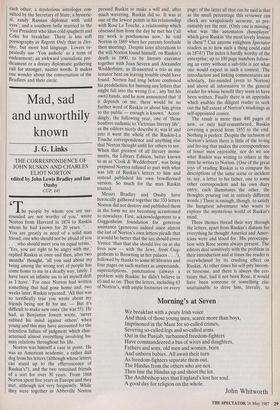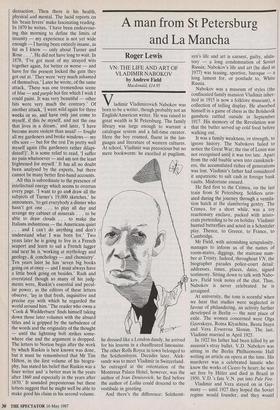Mad, sad and unworthily known
J. G. Links THE CORRESPONDENCE OF JOHN RUSKIN AND CHARLES ELIOT NORTON edited by John Lewis Bradley and Ian Ousby CUP, £45 The people by whom you are sur- rounded are not worthy of you,' wrote Norton from Harvard in 1874 to Ruskin whom he had known for 20 years. `. • • You are greatly in need of a solid man friend; one who should not be afraid of you . . . who should meet you on equal terms.' `Yes, you are right to be angry with me,' replied Ruskin at once and then, after two months' thought, 'all you said about my being among the wrong sort of people has come home to me in a deadly way, lately. I have been an infinite ass to let myself drift as I have.' For once Norton had written something that had gone home and, two weeks later, Ruskin repeated, 'All that was so terrifically true you wrote about my friends being not fit for me. — But it's difficult to make new ones' (he was 55). He had, as Benjamin Jowett wrote, 'never rubbed his mind against others' when young and this may have accounted for the relentless failure of judgment which char- acterised almost everything involving hu- man relations throughout his life.
Norton was himself a case in point. He was an American academic, a rather dull dog from his letters (although whose letters can stand up to the effervescence of Ruskin's?), and the two remained friends of a sort for over 30 years. From 1868 Norton spent five years in Europe and they met, although not very frequently. While they were together in Abbeville Norton pressed Ruskin to make a will and, after much wavering, Ruskin did so. It was at one of the lowest points in his relationship with Rose La Touche, a relationship which obsessed him from the day he met her Call my work is posthumous now,' he told Norton in 1869 when her parents forebade their meeting). Despite later alterations to the will Norton found himself, on Ruskin's death in 1900, to be literary executor together with Joan Severn and Alexander Wedderburn, as ill-assorted a trio as any testator bent on leaving trouble could have found. Norton had long before confessed his predeliction for burning any letters that might fall into the wrong (i.e., any but his own) hands, and he now announced that 'if it depends on me, there would be no further word of Ruskin or about him given to the public — enough is known.' Accor- dingly, the following year, one of 'those bonfires endemic to Victorian literary life', as the editors nicely describe it, was lit and into it went the whole of the Ruskin-La Touche correspondence and anything else that Norton thought unfit for others to see. When that greatest of all literary monu- ments, the Library Edition, better known to us as 'Cook & Wedderburn', was being prepared Norton refused to part with what was left of Ruskin's letters to him and instead published his own bowdlerised version. So much for the man Ruskin trusted.
Messrs Bradley and Ousby have heroically gathered together the 333 letters Norton did not destroy and published them in the form we are becoming accustomed to nowadays. First, acknowledgement to a Guggenheim foundation for generous assistance (generous indeed since almost the last of Norton's own letters pleads that it would be better that the sea should cover Venice 'than that she should live on as she lives now — with the Jews, from Gug- genheim to Browning in her palaces . . .'), followed by thanks to some 60 libraries and four pages on such matters as ampersands, superscriptions, punctuation (always a problem with Ruskin: he didn't believe in it) and so on. Then the letters, including 63 of Norton's, with ample footnotes on every page; of the latter all that can be said is that as the small percentage this reviewer can check are scrupulously accurate, so pre- sumably are the rest. (Only one is missing; what was 'the automaton chessplayer' which gave Ruskin 'the most lovely lessons in chess'? Can anyone enlighten Spectator readers as to how such a thing could exist in 1874?) The index is hardly worthy of the enterprise; up to 100 page numbers follow- ing an entry without a sub-title is not what one would expect in such a context. The introduction and linking commentaries are scholarly, fair-minded (even to Norton) and above all informative to the general reader for whose benefit they seem to have been written. Finally there is an appendix which enables the diligent reader to seek out the full extent of Norton's misdoings as self-appointed censor.
The result is more than 400 pages of new, or only half-remembered, Ruskin covering a period from 1855 to the end. Nothing is perfect. Despite the inclusion of Norton's letters there is little of the to-ing and fro-ing that makes the correspondence of lesser men enjoyable, nor do we see what Ruskin was writing to others at the time he writes to Norton. (One of the great joys of reading Ruskin is to compare his descriptions of the same scene or incident in, say, a letter to his father, one to some other correspondent and his own diary entry; each illuminates the other, the thoughts pouring out in entirely different words.) There is enough, though, to satisfy the hungriest adventurer who wants to explore the mysterious world of Ruskin's mind.
Three themes thread their way through the letters, apart from Ruskin's distaste for everything he thought America and Amer- icans were and stood for. His preoccupa- tion with Rose seems always present. The editors deal sensitively with the problem in their introduction and at times the reader is overwhelmed by its crushing effect on Ruskin. At other times his self-pity becom- es tiresome, and there is always the cer- tainty that, had it not been Rose, it would have been someone or something else unattainable to drive him, literally, to distraction. Then there is his health, physical and mental. The lucid reports on his 'brain fevers' make fascinating reading. In 1870 he writes, 'I have been endeavour- ing this morning to define the limits of insanity — my experience is not yet wide enough — I having been entirely insane, as far as I know — only about Turner and Rose . . He did not have long to wait. In 1878, 'I've got most of my strayed wits together again, for better or worse — and have for the present locked the gate they got out at.' They were 'very much ashamed of themselves.' Later he wrote, of the same attack, 'There was one tremendous scene of blue — and purple hot fire which I wish I could paint. It was very beautiful — other bits were very much the contrary.' Of another attack, 'I went wild again for three weeks or so, and have only just come to myself, if this be myself, and not the one that lives in a dream,' and later, 'I have become more violent than usual! — fought all my gardeners and broke windows — my ribs sore — but for the rest I'm pretty well myself again (the gardeners rather dilapi- dated!)'. It is some relief to read, 'I suffer no pain whatsoever — and am not the least frightened for myself.' It has all no doubt been analysed by the experts, but there cannot be many better first-hand accounts.
All this is subordinate to the presence of intellectual energy which seems to overrun every page. want to go and draw all the subjects of Turner's 19,000 sketches,' he announces, 'to get everybody a dinner who hasn't got one . . . to play all day and arrange my cabinet of minerals . . . to be able to draw clouds . . . to make the Italians industrious — the Americans quiet . . . and I can't do anything and don't understand what I was born for.' Two years later he is going to live in a French seaport and learn to sail a French lugger and next he is 'working at mythology and geology, & conchology — and chemistry'. Ten years later he has 'seven big books going on at once — and I must always have a little book going on besides.' Rash and overstated though so many of his judg- ments were, Ruskin's essential and pecul- iar power, as the editors of these letters observe, 'lay in that fresh, inquisitive and precise eye with which he regarded the world around him.' The reader who owns a `Cook & Wedderburn' finds himself taking down those later volumes with the absurd titles and is gripped by the turbulence of the words and the originality of the thought — until the lightning bolt strikes some- where else and the argument is dropped. The letters to Norton begin after the work by which Ruskin is best known was done, but it must be remembered that Mr Tim Hilton, in the first volume of his biogra- phy, has stated his belief that Ruskin was a finer writer and 'a better man in the years after 1860 and especially in the years. after 1870.' It sounded preposterous but these letters suggest that he might well be able to make good his claim in his second volume.





















































 Previous page
Previous page